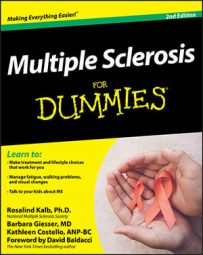For many people, the idea that MS can affect the way they think is the most frightening aspect of this disease. “I can handle the physical symptoms, just don’t mess with my mind” is a pretty common refrain.
Surprisingly enough, cognitive changes weren’t even acknowledged or addressed by the medical community until about 25 years ago (which is somewhat perplexing given that Jean-Martin Charcot noted these symptoms in his early descriptions of MS in the late 1800s). For years, patients were told that MS couldn’t affect the mind or that it did so only rarely. But fortunately, MS researchers and clinicians have finally begun to focus significant attention on this important problem.
Remember that cognitive dysfunction isn’t an emotional disorder — a person can have problems with thinking and memory without having an emotional problem.
The term cognition refers to the higher-level functions of the human brain, including:
Processing incoming information (attention and concentration)
Acquiring, storing, and retrieving new information (learning and memory)
Organizing and manipulating information to prioritize and problem-solve, as well as plan and execute complex activities (executive functions)
Acting on information and communicating it to others (expression)
Even though the list makes these functions sound separate and independent, remember that they’re in fact interdependent. For example, you can’t remember something without having paid attention to it in the first place.
You also can’t organize information in an effective way if you can’t remember it; nor can you deal with information effectively or communicate it to others without having learned and organized it in a meaningful way. Therefore, problems in any one of these functions can affect how you think and perform.
It’s important to familiarize yourself with the kinds of changes that can occur because:
Cognitive changes can occur at any time, and they don’t appear to correlate with either length of time since diagnosis or the level of a person’s physical disability. For example, a person with significant physical limitations, who has had MS for some time, can be free of cognitive symptoms, while a person with a recent diagnosis and few physical symptoms can have significant cognitive impairment.
Even relatively mild symptoms can have a pretty big impact on various activities of daily living. For instance, people with MS are more likely to leave the workforce because of cognitive symptoms and fatigue than because of mobility problems! Early departure from the workforce is a critical issue for people with MS, but it can often be avoided with adequate symptom management.
Cognitive fatigue can interfere with your ability to get things done. Research has shown that people with MS who are concentrating very hard on a cognitively strenuous task can experience a kind of mental fatigue that feels like acute “brain drain.” Fortunately a brief rest from the task will generally help you get back on track.
Cognitive changes tend to progress slowly over time. Even though MS relapses can include a sudden worsening of cognitive symptoms as well as physical ones, which tend to improve as a relapse ends, problems with thinking and memory don’t generally disappear completely.
The sooner these kinds of cognitive problems are identified, the easier it is to develop effective strategies to manage them. Small problems are always easier to work around than bigger ones. When you’re able to put your finger on a problem with thinking or memory early on, you can find ways to compensate for it before the problem begins to interfere significantly with your daily life.
Like the physical symptoms that can occur in MS, the cognitive changes are highly variable from one person to another. One person may experience a lot of problems while another person experiences none or very few. In other words, no two people experience the same changes in exactly the same way.

